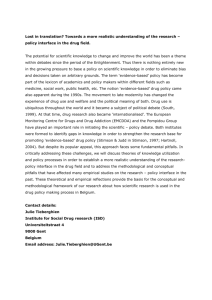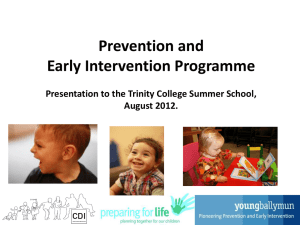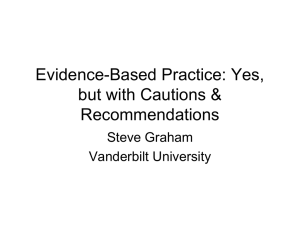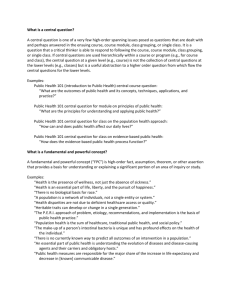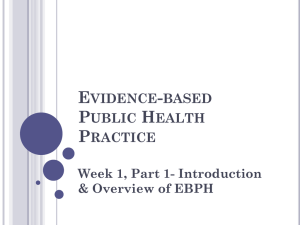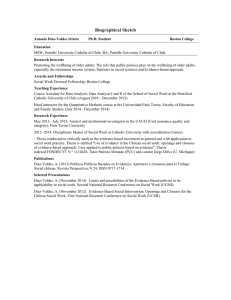Evidence-based health care from the consumer’s point of view Presented by:
advertisement
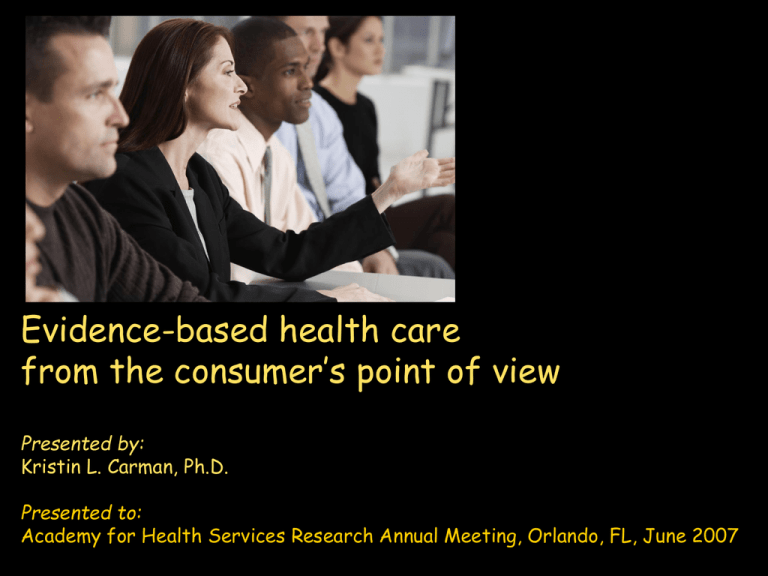
Evidence-based health care from the consumer’s point of view Presented by: Kristin L. Carman, Ph.D. Presented to: Academy for Health Services Research Annual Meeting, Orlando, FL, June 2007 Project team and funding American Institutes for Research Kristin L. Carman, PhD, Project Director Pamela Dardess Christine Whitmore, PhD Carolyn Vance McGee & Evers Consulting, Inc. Jeanne McGee, PhD Mark Evers, PhD Funding California Health Care Foundation Purpose of our project To develop a Communication Toolkit – “Explaining evidence-based health care to your workforce” To build the Toolkit, assess and understand: What are employers and unions doing to communicate on this topic What are desired topics and components of the Toolkit What are consumers’ understanding of different components of EBHC Methods and data Environmental scan Literature review Review of websites 10 phone interviews with experts 15 Key stakeholder interviews with information intermediaries representing unions and employees 4 Focus groups (2 union groups, 2 non-union groups) Cognitive Interviews (Round 1 completed) Future activities include: 4 additional rounds of cognitive testing of materials Survey of consumer attitudes about evidence-based concepts (sponsored by the NBGH) Findings to date – five themes Comprehension Relevance Overload Trust Discomfort THEME # 1 - Comprehension Consumers struggle to figure out what is meant by “evidence-based medicine” Where does evidence come from? What are “guidelines” or “best practices”? Who decides what is “good” evidence? Who decides when and how guidelines should be applied? Reactions we got from consumers “it’s nothing new” [evidence?] “my doctor tries different things on me until he finds what works.” “it could be harmful” “it could be biased” “it sounds like ‘one size fits all’ and that could get in the way of medical judgment” It’s often counter-intuitive When people believe that “more care is “better care,” or that it’s hard to accept any evidence that says otherwise When people believe that “good quality costs more,” it’s hard to accept evidence that good quality can sometimes cost less When people believe they are unique, it’s hard to accept uniform standards for care THEME # 2 – Relevance Consumers may question what evidence-based medicine means for them personally Reactions we heard from consumers People tend to trust their own judgment about “quality” of medical care Even when they acknowledge possible problems with quality, they think their doctor or care is great When medical evidence or guidelines are invoked, some think it second guesses their doctor’s good judgment THEME # 3 - Trust Consumers tend to be suspicious of employer’s motives in moving toward evidence-based approaches Basic lack of understanding Consumers lack awareness and knowledge of how employers and insurance companies are involved in benefit design and the financial side of health care It’s hard for consumers to appreciate the broader context that impels changes Distress about rising costs and changes to health care benefits Consumers are distressed and distrustful, especially when cutbacks in benefits are coupled with higher costs Consumers get frustrated about new layers of control over what kinds of care are covered, how and where they can get care, and what they have to pay Consumers often feel that employers are more concerned with the bottom line than with employees’ health With evidence-based changes to benefits design, distrust can be worse Hard for consumers to understand how employers might use medical evidence to guide changes to benefits and how the changes might be helpful to consumers Consumers may feel that their employer is getting into an area where they don’t belong The irony: trying to empower consumers can have the opposite effect Frustration that employers are making changes, taking away options, and shifting responsibility to employees Rather than feeling more empowered about their health, consumers can feel that they are losing control THEME # 4 – Discomfort Being urged to be better informed and more assertive about their health care puts pressure on consumers It’s hard to challenge the traditional doctor-patient relationship Patients are used to relying heavily on their doctors and they can feel vulnerable It can be hard to ask questions, let alone challenge what the doctor advises Knowing that quality of care can vary a lot is not welcome news if patients feel unable or unwilling to act upon it THEME # 5 - Overload Consumers already feel overwhelmed with information and short on time. Needing to understand and deal with medical evidence adds to the overload. For more information, contact: Kristin L. Carman, PhD Principal Research Scientist American Institutes for Research 1050 Thomas Jefferson St., NW Washington, DC 20007 202-403-5090 Kcarman@air.org www.air.org
